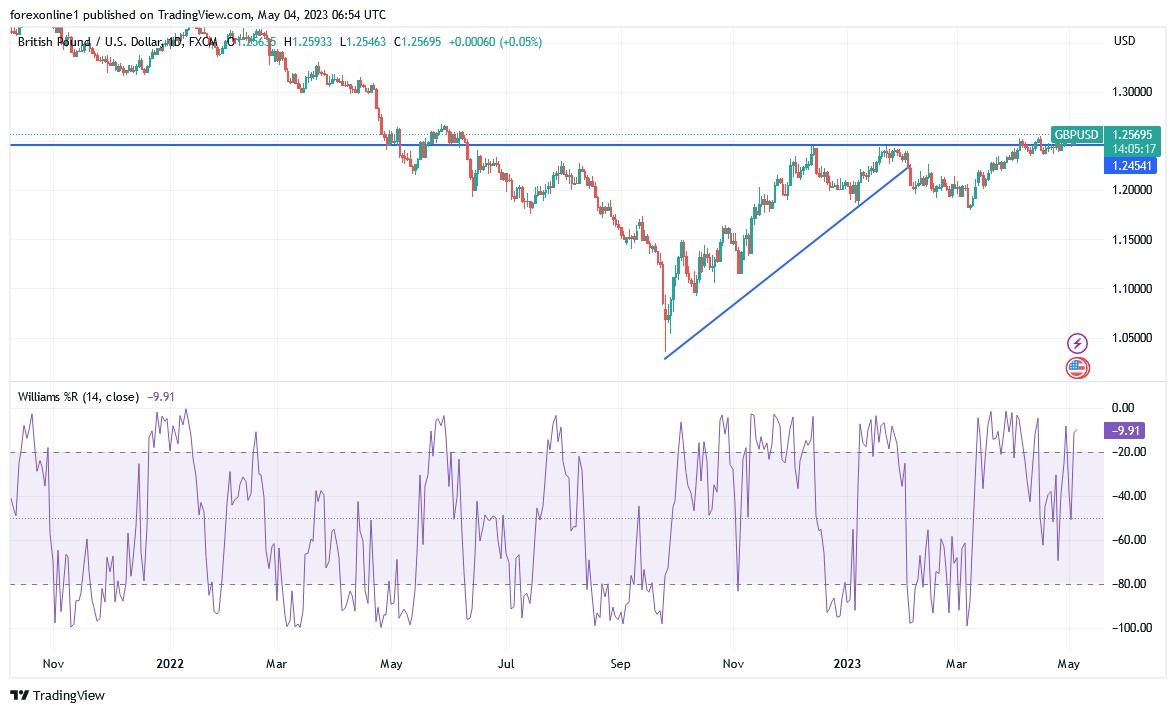[ad_1]
A combination of concerns in global financial markets and a lack of UK-specific drivers meant that the pound struggled against the euro, dollar and others in early May, although downside is likely to remain limited. A quarter-point hike in the US interest helped the bulls push the GBP/USD towards the 1.2590 resistance level, the highest for the currency pair in almost a year.
Prior to that, the price of the pound sterling tracked the global stock markets lower as the global markets returned from the May Day holiday, which indicates the return of the traditional positive correlation of the pound with stocks. “A new mix of concerns has hit stocks hard,” said Chris Beauchamp, senior market analyst at IG. Last week saw risk appetite pick up as earnings improved from tech giants, but a host of concerns about interest rates, more banking crises, the US debt ceiling and of course pre-Fed nerves have conspired to trigger a reversal in stock markets.
The analyst adds, “Indices have declined sharply, as investors’ nerves are improving.”
To make sure that May is the month in which the pound tends to lose value because it has historically caused losses in the stock market; Historically, the old adage “sell may and go far” has been true of the pound sterling as well.
For his part, says Daniel Vernazza, an analyst at UniCredit Bank. If this call is correct, the pound may break its recent monthly highs against both the euro and the dollar.
According to trading, the exchange rate of the pound to the euro fell by a third of a percent to 1.1343, as it gave up the gains achieved in the last week of April, as investors bet that the European Central Bank meeting today, Thursday, will witness another increase in interest rates, with promises to provide more to come. The pound fell against the dollar by a quarter of a percent at 1.2460, as investors seemed to reduce bets on the bearish trend of the dollar ahead of the US policy event, which is supposed to see the announcement of another hike of 25 basis points, which did happen.
But the market is betting that this is the latest rally and has been a strong dollar seller in 2023 as it also expects cuts to begin in the second half. The natural risk is that the Fed pushes back against this well-worn trade, causing a sharp reversal in the likes of GBP/USD as positions get exposed in one direction. Meanwhile, investors have steadily increased their “long” exposure to the euro in recent weeks on the back of better-than-expected data and expectations of a rate hike from the European Central Bank.
From a GBP perspective, exposure to the downside here is limited as the Bank of England will release its interest rate decision and monetary policy report on May 11th. “The bullish rhetoric for the pound has remained the same, suggesting a more limited scope for a decline,” says Joe Manimbo, senior forex analyst at Convera. And “the British economy doing somewhat better than expected is positive for sterling and for the outlook for the region leading interest rates at higher levels closer to 5%.”
The new month started on a positive note with UK house prices unexpectedly rising, suggesting that the Bank of England has scope to raise interest rates by 25 basis points on two more occasions, thereby closing the gap with the Fed and potentially staying ahead of the ECB.
- The stability of the GBP/USD currency pair remains around and above the 1.2500 resistance to confirm the bulls’ control.
- With the passage of the Federal Reserve’s decisions, the resistance levels 1.2620 and 1.2700 may be the most important targets for the current trend.
- It will push the technical indicators towards strong overbought levels.
- I still prefer selling the GBP/USD from every upside.
On the other hand, and for the same period of time, the move of the bears towards the support level 1.2380 will be important to change the direction of the currency pair to bearish.
Ready to trade our Forex daily analysis and predictions? Here are the best forex trading platforms UK to choose from.

[ad_2]
